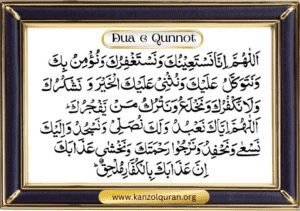Dua e Qunoot is a prayer recited during the Witr prayer, usually in the last rakat. It is a pious invocation, invoking Allah for success, shield, and pardon. However, this dua is a sign of humbleness and a revelation of Allah’s mercy and strength. In this article, we will learn the recitation, meaning, and importance of Dua e Qunoot so everyone knows why it is essential for Muslims when praying.
What is Dua e Qunoot?
Dua e Qunoot is also read during the Witr prayer after bending or bowing (ruku) in the last rak’ah. According to the Sunni Hanafi Madhab, it is required in the Witr prayer. It is recited in others on some occasions and in exceptional circumstances only.
In Arabic, the word Qunoot means obedience, devotion, and submission. This supplication is characteristic of those qualities; it imperatively seeks Allah’s (SWTAllah’s
Recitation of Dua e Qunoot
Dua e Qunoot is prayed only in the last rak aah of the Witr prayer, mainly after ruku (bowing down). Depending on one’s school, one should read before ruku.
اللَّهُمَّ إِنَّا نَسْتَعِينُكَ وَنَسْتَغْفِرُكَ وَنُثْنِي عَلَيْكَ الْخَيْرَ كُلَّهُ وَنَشْكُرُكَ وَلَا نَكْفُرُكَ وَنَخْلَعُ وَنَتْرُكُ مَنْ يَفْجُرُكَ اللَّهُمَّ إِيَّاكَ نَعْبُدُ وَلَكَ نُصَلِّي وَنَسْجُدُ وَإِلَيْكَ نَسْعَى وَنَحْفِدُ وَنَرْجُو رَحْمَتَكَ وَنَخْشَىٰ عَذَابَكَ إِنَّ عَذَابَكَ بِالْكُفَّارِ مُلْحَقٌ
Translation of Dua e Qunoot
‘O Allah, I seek Your assistance and for Your forgiveness’. We trust in You and rely on You and bless You in the highest way. We bless You and we are not ingrate to You and we reject and depart from anyone who rebels against You.
Oh Allah, for us You are the only object of our prostration to andsumpthing only to You. Through You, we labor and we run, and we look forward to Your compassion; and we avoid Your anger. Indeed Your torment will surely befall the disbelievers.”
Meanings and Importance of Qunoot in Dua
The Dua e Qunoot is crucial as it includes glorifying Allah (SWT), seeking His assistance and repentance from sins, and asking His compassion while praying for His wrath. Let’s break The meaning of powerful supplication:
- Seeking Allah’s Help and Forgiveness: In the dua, one starts by appealing for Allah’s support or invoking His mercy. This is because we remain servants and debtors to Allah, who always needs His favor and forgiveness.
- Gratitude and Praise: The supplicant, in turn, assembles the Invocation of Allah, thanking Him and confessing to having received numerous bounties from Him. It insists on recognizing that every blessing is from Allah and that everyone should be grateful to Him.
- Rejecting Disobedience: The dua also says the prophet should turn his back on those who disobey Allah. This depicts the believers, especially the prophets and those who refrain from following the word of the Lord.
- Complete Devotion: The supplication states that all the formalities of the prayer rites, like recitation and prostrations, are for Him. This accords with the tenets of monism, in which only Allah is worthy of worship and to whom obedience is due.
- Hoping for Mercy and Fearing Punishment: The last verse of the dua is a joint Islamic statement after invoking Allah that declares hope in Allah’s favoAllah’s form of Allah’s AllaAllah’siAllah’s These two Allah’sons bAllah’sons believers deal with Allah through motivation to do good and abstention from sinful deeds.
When to Recite Dua e Qunoot
The Benefits of Reciting Dua e Qunoot
- Strengthens Connection with Allah: The repetition of Dua e Qunoot seems to re-establish the stance of badness or slavery in Allah. Mercy and guidance are in His hands alone.
- Spiritual Comfort: The supplication gives hope from Allah through a rescue from all those difficulties, strengthening the faithful’s faith.
- Forgiveness and Mercy: Dua e Qunoot asks for forgiveness for one’s sins and shortcomings and then approaches Allah with a repentant heart.
- Protection from Trials: Dua e Qunoot calms the heart in distress or at a difficult moment and assures us that Allah will help in every situation.
Conclusion
Dua e Qunoot is a powerful and meaningful supplication that plays a vital role in Islamic worship, especially during the Witr prayer. It encompasses praise, gratitude, repentance, and hope in Allah’s mercy while recognizing His power and authority. By regularly reciting this dua, Muslims can strengthen their relationship with Allah, seek His help, and stay connected to their faith.
We want every Muslim to practice Dua e Qunoot in Witr prayer and be abreast of its meaning. For more information about supplications and their translation, please check out three courses at Kanzolquran.org: Prayer and Its Types, Prayers Related to Faith, and Supplications in Prayer.
